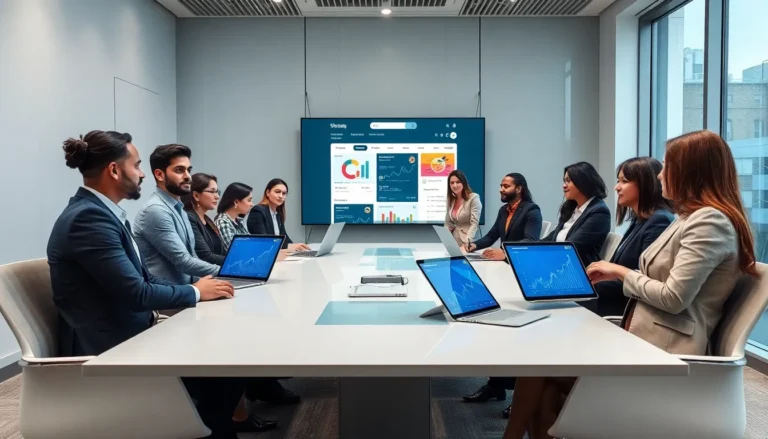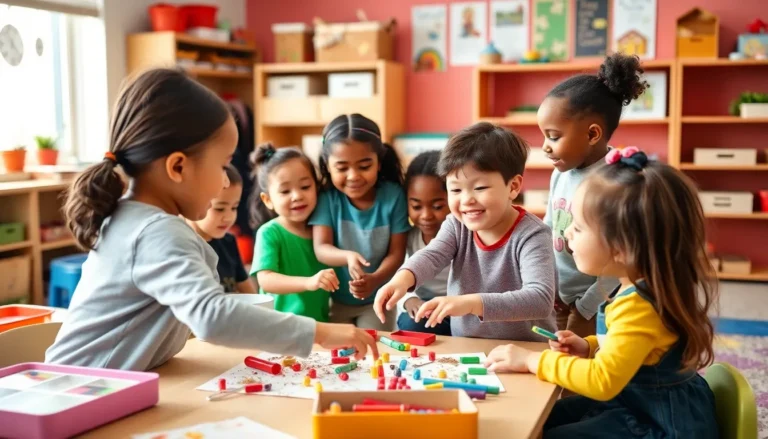Table of Contents
ToggleIn a world where chaos reigns supreme, parents are on a quest for the holy grail of early childhood education: Montessori day care. Picture this—children happily engaged in activities that spark their curiosity while avoiding the dreaded meltdown over snack time. Montessori isn’t just a buzzword; it’s a philosophy that empowers little ones to explore, learn, and grow at their own pace, all while keeping their sanity intact.
What Is Montessori Day Care?
Montessori day care functions as an educational environment that emphasizes child-led learning. It integrates principles of the Montessori method, which values independence and self-directed activity. Children engage with specific materials designed to enhance various skills such as problem-solving and critical thinking.
Activities in a Montessori day care encourage exploration and curiosity. Children choose tasks that interest them and can work at their own pace. This flexibility nurtures a love for learning while reducing stress during daily routines. Snack time and transitions occur seamlessly, allowing children to develop life skills alongside academic knowledge.
The setting usually includes mixed-age groups, fostering peer learning and cooperation. Younger children observe older peers, gaining skills through imitation. Older children often take on leadership roles, fostering a sense of responsibility.
Teachers in Montessori day care act as guides rather than traditional instructors. They observe and assess each child’s progress, offering support when necessary. This individualized attention helps address the unique needs and interests of each child.
Montessori day care prioritizes a prepared environment, carefully designed to be engaging and accessible. Materials are arranged on low shelves, allowing children to explore independently. The focus remains on hands-on activities that promote sensory learning and cognitive development.
Families find Montessori day care appealing due to its holistic approach toward early childhood education. The method cultivates skills that extend beyond the classroom, preparing children for future academic endeavors and social interactions.
Benefits of Montessori Day Care

Montessori day care provides numerous advantages for early childhood education. Emphasis on child-led learning promotes engagement and curiosity, allowing children to explore their interests deeply.
Child-Centered Learning
Child-centered learning remains a fundamental aspect of Montessori day care. Children choose their activities based on individual interests, fostering a sense of ownership over their education. Engaging materials help develop essential skills such as problem-solving and critical thinking. With individualized attention from teachers, children receive guidance tailored to their unique needs, enhancing the overall learning experience. Daily interactions among peers in mixed-age groups nurture collaboration and social skills. As a result, children develop a love for learning while building confidence in their abilities.
Fostering Independence
Fostering independence stands out as a key benefit of Montessori day care. The prepared environment encourages children to take action and make decisions independently. Materials are carefully arranged to promote easy access, supporting self-directed exploration. Children learn to manage their time effectively, choosing activities that align with their interests. Through tasks that require critical thinking, they develop resilience and resourcefulness. Observing their older peers allows younger children to model behavior and gain confidence. In this supportive atmosphere, children thrive as they learn to navigate challenges and solutions independently.
Key Principles of Montessori Education
The Montessori approach revolves around core principles that foster independent and engaging learning experiences for children. Central to this philosophy are the concepts of a prepared environment and hands-on learning.
Prepared Environment
A prepared environment is crucial in Montessori day care. This environment features a well-organized space filled with age-appropriate materials that invite exploration. Materials are thoughtfully arranged to promote independence, enabling children to access what they need easily. Orderliness supports children in taking responsibility for their actions, encouraging them to keep the space tidy. Mixed-age groups within the environment help facilitate peer learning. Younger children often learn from observing older peers, while older children can nurture and mentor. Such arrangements cultivate a sense of community and cooperation essential for social development.
Hands-On Learning
Hands-on learning stands at the core of Montessori education. Children engage directly with materials, sparking curiosity and creativity. Each material serves a specific educational purpose, targeting skills such as problem-solving and critical thinking. Children interact with concrete objects, making abstract concepts tangible. This method supports diverse learning styles, accommodating children who thrive on sensory experiences. Ongoing exploration encourages self-direction and motivates children as they choose tasks aligning with their interests. As a result, they develop a profound love for learning while honing essential cognitive and social skills.
Activities in Montessori Day Care
Montessori day care offers a variety of activities that engage and educate children through hands-on experiences.
Sensorial Activities
Sensorial activities help children refine their senses. They interact with specially designed materials that stimulate sight, sound, touch, taste, and smell. For instance, children might explore color tablets to understand different hues or use sound boxes to distinguish various sounds. Through these activities, children learn to classify, compare, and describe their sensory experiences. Engaging in such tasks enhances cognitive development while fostering creativity. Daily exposure to sensorial activities cultivates curiosity and supports critical thinking skills.
Practical Life Skills
Practical life skills activities focus on real-world tasks that promote independence. Children learn to pour, scoop, and clean, developing coordination and concentration. These tasks might include buttoning clothing or transferring objects with tools. Mastery of these skills nurtures self-confidence and responsibility. In a prepared environment, children practice daily routines, such as setting the table or caring for plants. Each activity emphasizes the importance of everyday life while encouraging children to take ownership of their learning. This approach helps children navigate challenges successfully and fosters a sense of accomplishment.
Choosing the Right Montessori Day Care
Selecting the appropriate Montessori day care involves careful consideration of several key factors. Assess the qualification and training of the teachers, ensuring they hold Montessori credentials. Quality teaching staff significantly impacts the learning environment and children’s engagement.
Visit potential facilities to evaluate the prepared environment. A well-organized space should include age-appropriate materials that encourage independence. Notice how materials are arranged; they should be accessible for children, fostering self-directed exploration.
Observe interactions among the children. Check that mixed-age groups are utilized, promoting peer learning and cooperation. Peer interaction supports social skill development and allows for natural leadership opportunities.
Inquire about the curriculum and daily routines. Effective Montessori day cares emphasize hands-on learning and child-led activities. Familiarize yourself with how the school balances structure with freedom, ensuring children feel supported yet encouraged to explore their interests.
Explore family involvement opportunities within the day care. Programs that involve parents foster a sense of community and strengthen connections between home and school. Open communication channels enhance the educational experience and provide valuable insights into each child’s progress.
Evaluate the overall atmosphere of the facility. A positive environment should feel welcoming and nurturing, allowing children to thrive. Trust your intuition; a comfortable, stimulating atmosphere often reflects a well-implemented Montessori philosophy.
Montessori day care offers a unique approach to early childhood education that prioritizes child-led learning and independence. This method not only fosters curiosity but also equips children with essential skills for future academic and social success. The emphasis on a prepared environment and mixed-age groups creates a supportive atmosphere where children can thrive.
Parents seeking a nurturing educational setting will find that Montessori day care aligns with their desire for holistic development. By encouraging exploration and collaboration, these programs instill a lifelong love for learning. As families consider their options, the benefits of Montessori education stand out as a compelling choice for fostering resilience and resourcefulness in young learners.








